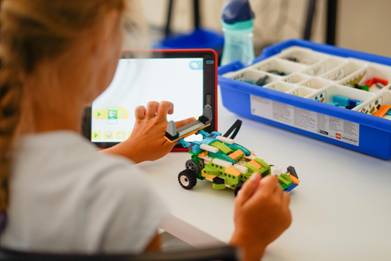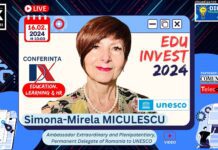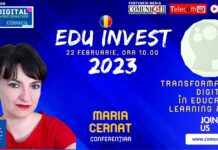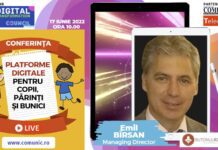Although programming was considered a subject for the older students, now there are a variety of courses offered for primary school age pupils throughout the EU, and their popularity is growing. Deservedly so, as coding will be a much larger part of the working life for the future generations than it is today. Since the current employers are already facing a growing shortage of professionals literate in programming languages, there is a need for holistic approaches that would tackle this issue before it gets out of hand.
Having proved to be one of the most attractive European cities for tech companies, Lithuania’s capital Vilnius makes kids’ technological education one of the top priorities, combining formal IT courses in school with strong informal education options thanks to its multiple coding academies for children. A number of growing private initiatives in Vilnius are contributing to the swift rise in the number of pupils learning to code.
One example of such initiative, CodeAcademy Kids, located in Vilnius and throughout Lithuania, has received a double number of children this year – the predicted total number for 2019 is 1.3 thousand kids – and expects to double this number again in 2020. The majority of the children at CodeAcademy Kids are 8-12 years old, without any prior experience in coding, but the academy teaches youngsters of up to 18 years old, too.
According to the Academy’s director Aurelija Makselytė, kids who are learning to code are increasingly younger, mostly due to the strengthening role of technology in everyday life. The coding school’s goal is to teach the children coding in a creative way, and the diverse teaching methods ensure the students are sharpening their logic skills, attention to detail, and teamwork.
The municipality of Vilnius plays its part to introduce as many children as possible to the IT field, too. The Microcomputers for Kids initiative was launched by Vilnius municipality in Lithuania, and in two years more than 20 thousand computers have been gifted to fifth graders who use them to learn to code through various game-like environments. „It is important to motivate children to be curious about technology through games and other fun activities. We want to create a society where technological talent is as appreciated as it is in sports or arts,” said Povilas Poderskis, the CEO of Vilnius municipality.
For example, Robotics Academy focuses on turning children into the masters of both worlds – virtual and real, by combining programming skills with hardware, such as LEGO robots. „Our way of teaching is to identify a real-life problem and solve it by letting the children work in a team, generate ideas and apply their new skill set,” said Kristijonas Vasiliauskas, an inventor and one of the founders of Robotics Academy. According to him, the most important thing is to help pupils achieve control over technology and not the other way around. The growing interest in robotics is clearly visible in the number of pupils the academy teaches – last year, 5500 students across Lithuania attended the classes, and the number has been increasing yearly.
In addition to problem-solving, another key element to ICT education is creativity. Vilnius-based creative technology academy Bit&Byte, funded by Google, offers a mentorship program that lets children learn a variety of skills from the industry professionals. The program offers courses in 3D modelling, digital art, game development, artificial intelligence, and coding. „Besides educating future programmers, we nurture tomorrow’s creators’ curiosity, creativity, and critical thinking,” says Rasa Syminaitė, communications representative of Bit&Byte.
According to experts, coding in preschool helps children develop skills that are useful for the rest of their lives. For example, kids learn computational thinking early on that intersects disciplines of logic, mathematics and development of algorithms. This is a very valuable skill in problem-solving and critical thinking. On the other hand, coding facilitates creativity, as it pushes children to select coding variations and to find solutions.
The increased attention to coding is already showing results in Lithuania. For example, in 2018 Lithuanian students aged 15 to 17 won silver at the international FIRST Lego League robotics competition in Detroit. The team introduced an innovative idea of ecological city block which prevents water shortage and presents a safe wastewater management solution.
With an approaching major ICT employment gap, it’s important to ensure that the youngest generation is prepared for the unexpected challenges of the future job market from the get-go.















